> [Archived] Interviews

Interview with director Robert Lehmeier
Mr Robert Lehmeier, on Sunday, the International Week of New Music opens with an event included in the "Gulliver" series of the project. I'd like to ask you to tell us what are the aims of the " Opera in your Pocket" event?
"Opera in your Pocket" is a continuation of a project we held in 2020, in collaboration with the National University of Music in Bucharest, and the main idea was to give young Romanian artists the opportunity to create a new musical theater. In this respect, the first edition of the project started with "You are Fidelio", which in the end took the shape a film, due to pandemic conditions. It's always important to keep the continuity when you propose something new to young artists. So, together with the Goethe Institute, I came up with the concept of "Opera in your pocket",which means something that you can easily take with you, an art form with chamber music orchestras, which reunites young artists, composers, librettists, costume designers and so on, to give them the possibility of creating a new form of musical theater.
After I came in contact with many talented artists from Romania in 2020, I've understood that there are not enough opportunities for them. We all know that opera requires a lot of time, large financial resources and, of course, effort from an entire team, but the idea was to create an opportunity for these young people and that's how we ended up working on three new "pocket operas".
How did you come up with the programme of the event?
The programme was a lot of work. We started in 2021, with a series of workshops consisting of 2 weeks of mentorships with stage designers, composers, writers. I was part of a team of mentors for young directors, Dan Dediu advised the composers, Adrian Damian mentored the stage designers and costume designers and so on. All these workshops brought together people eager to offer guidance to young and less experienced people in the creative process, and that showed us how important is the communication between artists. That seemed strange because in the world of musical theater we have to communicate, but inside the team this process can be very difficult. So, learning how to communicate in this world was one of the lessons taught during the workshops, like the relationship between a composer and a librettist, for example, where the musician has to learn how to relate to the text, and the writer how to understand the music. One of the main themes was facilitating the understanding of the idea that you experiment with your partner. Usually, if you are a composer and you write a symphony you can stay inside your room, isolating from the world around you, but the opera it's different. We paid special attention to ensuring a stable communication between the team members, process which took about 2 years, during which the teams have been restructured many times to discover what were the best matches of participants. So, for almost two years, our two main concerns were forming the best teams and, of course, time management- because we had our deadlines and everyone was late, as usual. As I was saying, the opera takes a lot of resources and involves many people, and if you take a look at the teams that made possible the staging of the three operas, you will be amazed at the number of those who take part in a project such as "Opera in your Pocket".
What were the sources of inspiration of the operas and how did the rehearsals go?
I am big believer in the core principles of everything we do as artists, and in the opera that principle is telling stories through music and singing. The first problem we had to solve was composing the librettos, the writers having to choose stories that were worth telling. As you can see if you take a look at the programme, the three subjects are very different."It's your fault!" is a contemporary and disturbing subject, and the other two, "Primordial Soup", which transports us into the past, and "Money, money, money" which is about man's greed, have more fictive subjects. Even if there was a great number of texts, the three librettists considered that these are stories worth telling. So, the starting point was the literary source, and from there, the composers had to show their ability of transposing these stories into music. And that was, of course, an interesting process to watch.
I'd like to use this occasion to express my hope that Bucharest and Romania will offer these talented young people the opportunities they need to further evolve, because there is a lot of talent and a very good education. If I were to be asked what I wish for this country, I'd say a small room to stage the new musical theater and the assurance of financial support for 5 years, let's say, nothing too complicated, just something that would ensure continuity to these young people. I think that is the main idea. You can obtain great results out of projects such as "Opera in your Pocket", but if nothing follows, the progress will vanish. The basis it's there, you have artists that are capable of creating something excellent, so I would like to encourage politicians or anyone who has sufficient funds, to invest in the future of this wonderful form of art.
Translated by Ioana Busuioc,
University of Bucharest, Faculty of Foreign Languages and Literatures, MTTLC, year II
Corrected by Silvia Petrescu














